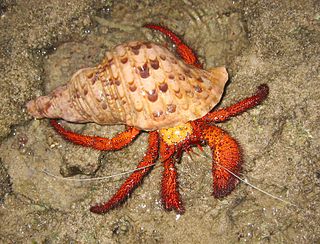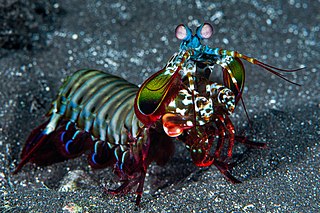
The Caridea, commonly known as caridean shrimp or true shrimp, are an infraorder of shrimp within the order Decapoda. This infraorder contains all species of true shrimp. They are found widely around the world in both fresh and salt water. Many other animals with similar names – such as the mud shrimp of Axiidea and the boxer shrimp of Stenopodidea – are not true shrimp, but many have evolved features similar to true shrimp.

Anomura is a group of decapod crustaceans, including hermit crabs and others. Although the names of many anomurans include the word crab, all true crabs are in the sister group to the Anomura, the Brachyura.

Odontodactylus is a genus of mantis shrimp, the only genus in the family Odontodactylidae. Mantis shrimp of the genus Odontodactylus can not only detect circular polarisation of light, but can also detect polarised light reflecting off their telson and uropods.

The Ocypodidae are a family of semiterrestrial crabs that includes the ghost crabs and fiddler crabs. They are found on tropical and temperate shorelines around the world.

Squillidae is a family of mantis shrimp, the only family in the superfamily Squilloidea. The type genus is Squilla. It is the stomatopod family with the most genera, as follows:
Eurysquillidae is a family of mantis shrimp. Formerly placed in the superfamily Gonodactyloidea, it has since been recognised that eurysquillids are closer to families in the Squilloidea, and so Eurysquillidae has been placed in its own superfamily, Eurysquilloidea. It includes six genera and 30 species

The Processidae are a family of shrimp, comprising 65 species in five genera, and the only family in the superfamily Processoidea. They are small, nocturnal animals, mostly living in shallow seas, particularly on grass flats. The first pereiopods are usually asymmetrical, with a claw on one, but not the other. The rostrum is generally a simple projection from the front of the carapace, with two teeth, one at the tip, and one further back.

Cymothoida is the name of a suborder of isopod crustaceans with a mostly carnivorous or parasitic lifestyle. It contains more than 2,700 described species in four superfamilies. Members of the suborder are characterised by their specialised mouthparts which include a mandible with a tooth-like process which is adapted for cutting or slicing.

Gonodactylaceus, is a genus of mantis shrimp. The genus was first described in 1995 by Raymond Brendan Manning and contains the following species:

Acanthosquilla is a genus of stomatopod crustacean. The American carcinologist Raymond B. Manning named and first circumscribed the genus in 1963. As of 2018, the World Register of Marine Species recognizes the following eight species:

Acanthosquilla derijardi is a species of stomatopod crustacean. Its distribution is widespread throughout the Indo-West Pacific. The species was initially described by the American carcinologist Raymond B. Manning in 1970. Its junior synonym, A. sirindhorn, was named in 1995 in honor of Princess Sirindhorn of Thailand.

Oratosquilla is a genus of crustaceans belonging to the family Squillidae. The species of this genus are found in Indo-West-Pacific. The genus was first described in 1968 by Raymond Brendan Manning.
Aborolobatea is a genus of crustaceans in the Oedicerotidae family, and was first described in 1984 by Michel Ledoyer.

Parasesarma messa, commonly known as the maroon mangrove crab, is a species of burrowing crab found in Queensland, Australia. It lives in mangroves in estuaries and sheltered bays. It was originally described as Sesarma messa, but was placed in the genus Parasesarma in 2017. Perisesarma messa is also a synonym.

The Nikoides are a genus in the Processidae family of shrimp, first described in 1875 by Otton Mikhailovich Paulson.

Aatolana is a genus of crustaceans in the family Cirolanidae, first described by Niel L. Bruce in 1993. The genus name is from the Greek, Aatos (insatiable), and refers to the ability of shrimp of this genus to devour fish carcasses. The type species is Aatolana rapax.

Aatolana schioedtei is a species of crustaceans in the family Cirolanidae, first described by Edward J. Miers in 1884 as Cirolana schioedtei. In 1993, Bruce reasssigned the species to the genus, Aatolana.
Aatolana springthorpei is a species of crustaceans in the family Cirolanidae, first described by Stephen John Keable in 1998.
Dolicholana is a genus of isopod crustaceans. which was first described by Niel L. Bruce in 1986. The type species is Cirolana elongata Milne Edwards, 1840.
Erugosquilla septemdentata is a species of shrimp in the family, Squillidae, and was first described in 1994 by Shane T. Ahyong as Oratosquilla septemdentata. The name was revised to Erugosquilla septemdentata in 1995 by Raymond B. Manning.














